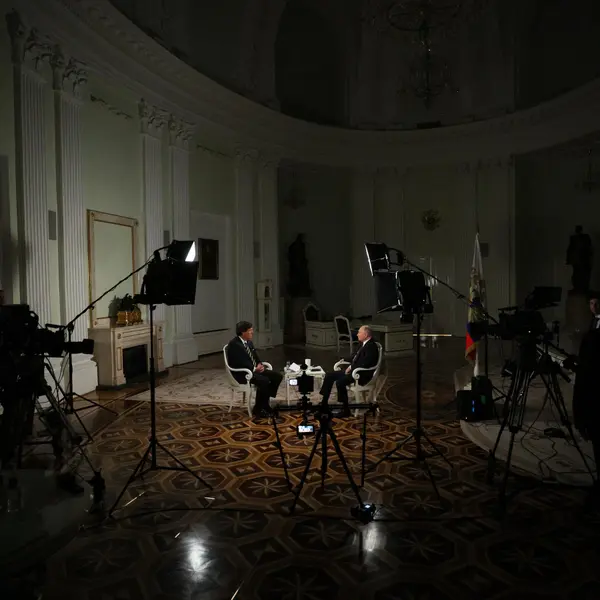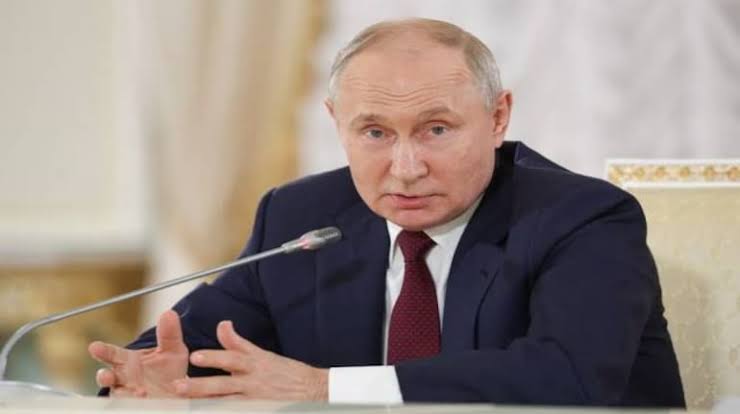Analyzing Putin’s Interview with Tucker Carlson: A Detailed Examination of Messages, Strategies, and Responses

President Vladimir V. Putin’s recent two-hour interview with former Fox News host Tucker Carlson has ignited widespread analysis and debate. While Putin’s central message aimed to convey Russia’s willingness to negotiate a peace deal in Ukraine, the interview’s meandering nature, marked by discursive historical diatribes, has overshadowed this key point. This article provides a comprehensive analysis of Putin’s interview, delving into the intended message, its reception, and the underlying geopolitical strategies at play.
Putin’s Message and Intended Audience:
Throughout the interview, Putin reiterated Russia’s desire to negotiate a peace deal in Ukraine, albeit on terms favourable to the Kremlin. This message appeared targeted at the American right and Republicans in Congress, with the strategic aim of undermining support for aid to Ukraine. By framing the conflict in terms of negotiation rather than aggression, Putin sought to present Russia as a diplomatic actor seeking resolution.
However, the clarity of Putin’s message was clouded by his extensive historical tangents, which delved into topics such as the Rurik dynasty and the Golden Horde. These diversions not only distracted from the main point but also left Carlson and viewers bewildered, detracting from the effectiveness of Putin’s communication strategy.
Also Read:Russian Naval Ship is Damaged in Crimea Airstrike by Ukrainian Forces
Missed Opportunities and Criticism:
Critics, including Margarita Simonyan of RT, lamented Putin’s failure to capitalize on his ideological commonality with Carlson’s followers, particularly regarding opposition to liberal social causes such as L.G.B.T.Q. rights. Simonyan pointed out that Putin neglected to market Russia as a “safe haven” against such causes, blaming Carlson for not asking the right questions. This oversight underscores a missed opportunity for Putin to resonate with his intended audience and strengthen his messaging.
Analysis of Putin’s Strategy:
Political analysts have offered insights into Putin’s overarching strategy behind the interview. Some speculate that Putin’s primary aim was to compel the West into a favorable deal to end the conflict in Ukraine, solidifying Russia’s control of captured territory and potentially influencing the government in Kyiv. By presenting negotiations as a diplomatic solution, Putin sought to shift the narrative away from military aggression and towards diplomatic resolution.
However, amidst his historical diatribes, the true intent of Putin’s message often became obscured. While he presented negotiations as a pathway to resolution, the broader geopolitical implications of Russia’s strategic goals remained a subject of scrutiny and debate.
Response in Ukraine and Beyond:
In Ukraine, officials dismissed Putin’s overtures as unserious, viewing them as an attempt to undermine support in Congress for military assistance. Ukrainian commentators criticized the interview as a “two-hour marathon of delusions and fakes,” emphasizing their commitment to defending Ukraine’s sovereignty against Russian aggression.
Internationally, the interview sparked debate over Putin’s motives and intentions, with analysts questioning the effectiveness of his communication strategy. While Putin may have aimed to sway American policies on Ukraine, the mixed reception and criticism suggest that his message may not have resonated as intended.
Conclusion:
Putin’s interview with Tucker Carlson serves as a microcosm of broader geopolitical tensions surrounding the conflict in Ukraine. While Putin sought to convey Russia’s willingness to negotiate a peace deal, his message was overshadowed by tangential historical discussions and missed opportunities to engage with his intended audience effectively. As the conflict continues to evolve, the impact of Putin’s interview on diplomatic efforts and international relations remains uncertain, highlighting the complexity of navigating geopolitical challenges in the modern era.


